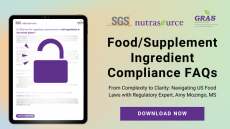Leafreport: Half of CBG products tested don't meet label claim

CBD watchdog Leafreport recently announced the results from a comprehensive review of hemp-derived cannabigerol (CBG) products that examined the accuracy of advertised CBG amounts. The research found that over half of the products sent for testing contained the wrong amount of CBG. The website noted that these products were off from the labeled CBG strength by anywhere from 10% to 65%.
The peer-reviewed watchdog website purchased 38 CBG products and sent them to SC Labs for third-party testing. Leafreport’s experts compared the test results to the amount of CBG and other cannabinoids listed on the product label and description.
What they found
The most notable finding was that 53% of the 38 products sent in for testing contained the wrong amount of CBG.
Leafreport measures the accuracy of CBG products by comparing their labeled CBG strength to the amount found by the third-party lab tests. The tests consider those products whose cannabinoid amounts are within 10% of what's on the label to have met that label claim.
The report also revealed that out of 24 products advertised to carry a specific amount of CBG and CBD, only 4 (17%) matched both the CBD and CBG labels. In addition, seven products (29%) were accurate for CBG but not CBD, 8 (33%) were accurate for CBD but not CBG, and 5 (21%) were inaccurate for both. All 15 of the products that advertised to be broad or full-spectrum CBD had the right type of extract—a first for LeafReport, who has tested several CBD products in various formats.
Other key takeaways:
- The results suggest that it’s harder for brands to meet label claims for two rather than only one cannabinoid.
- Tinctures and capsules performed the best, with 57% receiving an A and another 29% getting a B. Gummies had similar scores.
- Topicals were the least accurate product category
- Products from leading brands performed better than those made by small companies
“CBG has become very popular as a minor cannabinoid recently, but it’s harder to source than CBD, so we set out to see if companies were providing what they advertised. Our findings from this report were quite astounding,” said Lital Shafir, the head of product at Leafreport.
“Leafreport’s mission is to help promote transparency across the CBD industry and educate consumers so they can access products that are safe and offer the contents being advertised. Reports like this shed light on CBG products, educate consumers, and hopefully encourage companies to be more diligent about their testing standards.”
While the results suggest there is room for improvement, the authors acknowledged their findings still exceeded expectations.
LeafReport has investigated label claims from several products, including delta-8, CBD for humans and pets, beverages, and more.



















